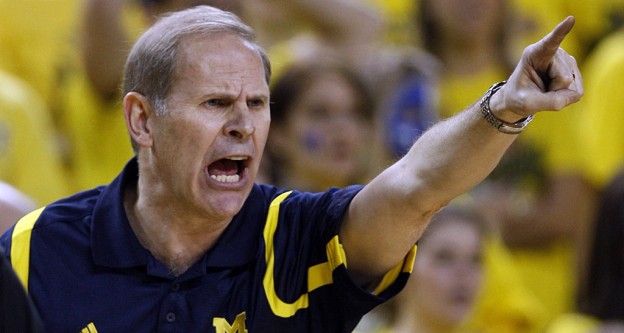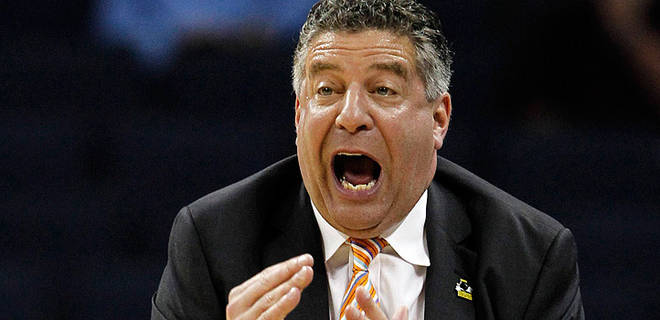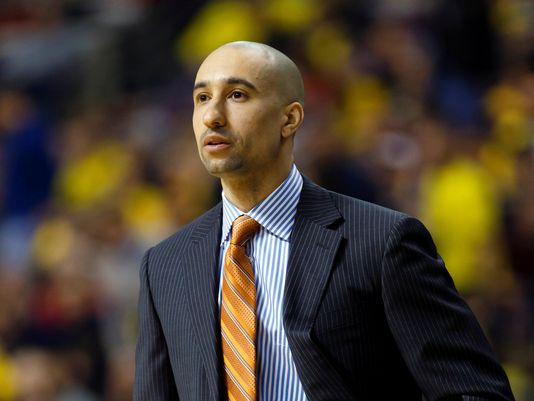The coaches who grab our attention.
The coaches who are set up to succeed.
The coaches whose reputations are most on the line.
Three coaching topics are brought to our lead basketball writers, Scott King and Steve Fetch, and Student Section managing editor Matt Zemek.
Where do you stand on these questions, one day before the college basketball season begins?
*
Question 1: Which coach fascinates you the most as the season approaches?
Scott King:
On Twitter @BearcatsBlog
Rick Barnes. He takes a lot of guff for some of his coaching decisions and his ultimate tournament success. After a 16-18 season, Texas didn’t have a ton of expectations last year. The young Longhorns rattled off 24 victories and won their first NCAA game since 2011. With Isaiah Taylor and the highly touted Myles Turner, this is thought of as a top-10 team. I’m really interested to see how Texas produces with expectations. Another short run in March, in light of only three tournament wins since 2009, would seem to turn the hot seat on a little bit.
Steve Fetch:
On Twitter @13fetch
I see a pattern developing, but for me it’s John Beilein. He’s worked magic with a ton of underrecruited kids before, and each year it seems like people forget that and doubt him. Caris LeVert wasn’t a highly ranked recruit, but people are penciling him in as the next star for the Wolverines, so maybe they’re learning a bit. Either way, I can’t wait to see what he does after losing Stauskas, McGary, Robinson, and Horford.

What new feat will John Beilein achieve this season at Michigan? Beilein took a few years to find the sweet spot in Ann Arbor, but now it seems that he’s hitting a home run with player development on an annual basis. It is now expected that Michigan will create breakout stars with assembly-line regularity in the state that made the automobile famous.
*
Matt Zemek:
On Twitter @SectionMZ
Cuonzo Martin is the name which jumps out at me more than any other, at least in relationship to this season alone. Martin made a highly complex decision — maybe it was simple for him in the end, but it certainly wasn’t an ordinary move. When a coach struggles at a program and then finally breaks through, the justified sense of vindication will often lead said coach to plant his feet at that program and entrench himself. Many a coach will gain a bunker mentality, something which can manifest itself in ways both good and bad.
Martin showed that he’s a different kind of cat. He made what was at best a lateral move, arguably a downward move, and sought a subculture which is substantially different from anything he’s previously known in his collegiate playing and coaching career — at West Lafayette, Ind. (player); Springfield, Mo. (coach); and Knoxville (coach). He could have told his fan base in Tennessee, “See, I proved it to all of you!” He could have reveled in the turnaround. Many would have.
Martin didn’t.
You might respect his move. You might think it was weaksauce. (I personally respect the move, but reasonable people can and will disagree.) The main thing to appreciate about this decision: Give Martin credit for being the captain of his own soul and listening to his own voice.
Whatever else you might think about his choice, it certainly came from a very personal place, not something steered by ego. Martin seemed to value peace of mind and a more relaxed environment. Was this an ego-less decision? No. Yet, was ego the driver of this decision? It would certainly seem that a more ego-centric move would have been to hold onto his previous post and bend the fan base to his will, now that he had some leverage to use. However, that leverage was exercised in the form of an escape, not an embrace of power.
Let’s see what Cuonzo does on the West Coast, in an entirely new environment. I’m not primarily interested in the results Martin will attain in Berkeley, at least not this season. The journey of this coach is currently more compelling than whatever destination he might reach a few years down the line.
*
Question 2: Which new coach at a program is best set up to succeed?
Matt Zemek:
Bruce Pearl is set up to succeed at Auburn. He won’t succeed this season, but does any other first-year coach inspire the same level of confidence in his attempt to fix a program? Put the matter this way: If you were to say, “_______ is the first-year coach who, four years from now, will have taken a moribund program to the Sweet 16 or better,” which other coach would fill in the blank better than Pearl? Tennessee has never been to the Final Four, and Pearl took the Vols to the Elite Eight while putting the program in position to contend for the Final Four on multiple other occasions. Auburn has never been to the Final Four, either, though Sonny Smith (1980s) and Cliff Ellis (1999, 2003) made strong runs at the prize.
Pearl, with his boundless energy and passion, attacks the game in a way that draws the attention of young players. Moreover, the use of a deep rotation means that playing time will be available for a larger number of players. Auburn did not cultivate quality depth under Tony Barbee. Pearl is positioned to reverse that trend and make the Tigers a factor in an SEC which has lacked quality coaching in locales not named Lexington or Gainesville.
*

If you’re doubting Bruce Pearl’s ability to turn Auburn into a top-tier SEC program, you’re likely in the minority.
Scott King:
I’m also going with Bruce Pearl. Auburn has been a program with success in the past. It’s been in the now distant past, but there was success. Pearl had a lot of success at Tennessee. He has proven that he can recruit to a football school. Let’s be honest, after Florida and Kentucky, the depth in the SEC isn’t exactly the Atlantic Ocean. A quick turnaround is very possible. Pearl has won everywhere – he’s never had a losing season. He’s going to recruit, he’s going to rally the fan base, and he’s going to get it done.
Steve Fetch:
I was going to go Pearl as well, but for the sake of being different I am going with Danny Manning at Wake. He’s already brought in some highly regarded recruits, and we’ve seen in the past that Wake is a place people can recruit to. He was a big part of the staff under Bill Self at Kansas, and he quickly turned Tulsa into a winner. It’s going to be tougher to do at Wake, especially sharing a state with North Carolina and Duke, but I think he can make the Demon Deacons a consistent ACC contender again.
*
Question 3: Tom Crean’s job is fairly evidently on the line as this season begins. Beyond the more immediate realm of job security, however, which coach’s larger reputation in the sport might depend on what he does this season?
Steve Fetch:
Shaka Smart. For all the talk about him as an up and coming coach and a candidate for every big job that opens, Smart has never won a regular season or conference tournament championship, and VCU has been very mediocre since that run to the Final Four in 2011, when the Rams were the last team to get into the dance. They’re expected to win the league handily this season, and beyond that, the Rams are expected to be a top 10-15 team. Therefore, while it’s not as though Smart will be on the hot seat if the Rams don’t do well, I think his reputation as one of the best young coaches in the game might take a hit if he doesn’t meet expectations.

Shaka Smart has the 2011 Final Four on his resume. In the past three years, he hasn’t enhanced that resume in any particularly substantial way. Can VCU dominate the Atlantic 10 and show that Smart can win when he’s expected to?
*
Scott King:
Kevin Ollie. I say this because what happens the year after? We’ve seen some one year wonder coaches. It’s so early in Ollie’s tenure at Connecticut that we don’t really know who he is as a coach or even a recruiter. Shabazz Napier isn’t walking through that door. The Huskies don’t have the same fire as the team that was banned from the tournament and whose players all chose to return to go after the national title. Any time a young coach loses a once-in-a-decade player, his reputation seems to be tied to what he does after that guy leaves. I don’t think this is a referendum on Ollie either way; I think if UConn doesn’t live up to expectations or loses early, there will be a lot of “He didn’t win without Shabazz” talk. If UConn goes to another Final Four, the question of how great he is will be a large reputation booster.
*
Matt Zemek:
Mark Turgeon took Wichita State to the Sweet 16 before George Mason eclipsed the Shockers as a feel-good story and made mid-major history at the Final Four in 2006. Turgeon moved to Texas A&M, where he made four NCAA tournaments in four seasons. Billy Gillispie laid a foundation for Turgeon, but the player on Kansas’s 1988 national championship team certainly sustained what his predecessor gave him. One would never call Texas A&M an easy place to win in college basketball, so when Turgeon made the upward move to Maryland, a program steeped in hoops history, the move not only made sense; it seemed appropriate and deserved.
Now, here we are, in the fourth season of Turgeon’s tenure as a Terrapin. There has been absolutely no progress to speak of in College Park. Maryland hasn’t danced in March. The Terps haven’t even made the NIT in two of Turgeon’s previous three seasons. The Turtles, instead of being feared, are moving as slowly as Turtles sometimes do.
Turgeon was supposed to affirm himself as a coaching star at Maryland, even more than another embattled coach, Mike Anderson. At Arkansas, Anderson was hired because he was Nolan Richardson’s protege. The move made sense for Arkansas — let’s be clear about that — but the point being emphasized is that part of the rationale for the move was that a favorite son was coming home in a very real way. There was no sentiment involved in Maryland’s procurement of Turgeon — the Terps simply (and understandably) thought that they were getting one of the best coaches available. The move looked really good at the time, but it just hasn’t paid off.
With Maryland moving to the Big Ten, a league which — in recent years — has actually been better than the ACC, it’s going to be very hard for Turgeon to break through to Bracketville in March. If Turgeon fails this season — and the odds suggest he will — where does he go to revive his career? Even more than Mike Anderson, Turgeon is the owner of a promising coaching career that just isn’t fulfilling its promise. It’s going to be fascinating to see how this drama plays out at Maryland.

